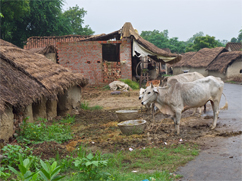Although it is clear mobile technology benefits women, there is little data available to better understand the day-to-day aspirations and challenges of women at the base of the pyramid. In order to work with and for them, the GSMA mWomen Programme, in partnership with USAID and AusAID, has commissioned a multi-country piece of research to explore the wants & needs of BOP women with the understanding that technology must meet the need, rather than vice-versa. Per Helmersen, GSMA mWomen Knowledge Manager, is currently reporting from the field where he is working on this research and he will be sharing some early, first-hand findings with the mWomen community on our blog during August. Today, he shares Aradhana’s story of living and working in a village in Uttar Pradesh and how her mobile links her to the outside world and income opportunities:

When Aradhana married her husband as a teenager she moved from the city to a remote village in Uttar Pradesh to live with and care for her husband and his extended family. Similar to other Thakur (higher caste) women, Aradhana was rarely allowed to go outside her house or courtyard, even for trips to the nearby market. Only on special occasions such as weddings and religious festivals, and when accompanied by a senior male, are married Thakur women permitted to venture outside.
Aradhana found it lonely and frustrating to not be able to continue with the education she had gained in the city or use her talents in her new setting. Eventually, she decided and received her husband’s permission to offer tailoring services to the Thakur community, as long as the services were provided from home. Over time her tailoring services expanded to include a variety of beautician services, which are in demand for weddings. Aradhana’s services are now recognised as the best in the community and, because they are in demand, her mobility restrictions are not quite as severe. She may occasionally venture into the village streets to visit clients.
Since she purchased her mobile phone a year ago her dealings with clients are more convenient and culturally appropriate because they can contact her at any time and inquire about their orders or her availability for weddings. Aradhana has apparently grown accustomed to her village lifestyle and actually prefers to stay at home. The mobile phone is her link to the outside world and income opportunities. She says she never uses it for private calls and she rarely places an outgoing call, even to her husband. For Aradhana the mobile is a business tool and nothing more. When she is required to visit clients she never takes her mobile with her since public displays of mobiles among women of her caste are unheard of in the village. It would generate gossip and threaten the family’s reputation.
Aradhana has also become a social entrepreneur in her village. Recognising the challenges faced by young Thakur girls and remembering her first encounter with village life, she is offering tailoring lessons free of charge in her home. They often ask her about her mobile phone, how to use it and how she convinced her family to let her have one. She willingly shares not only her tailoring skills but also information about the mobile phone with them.

